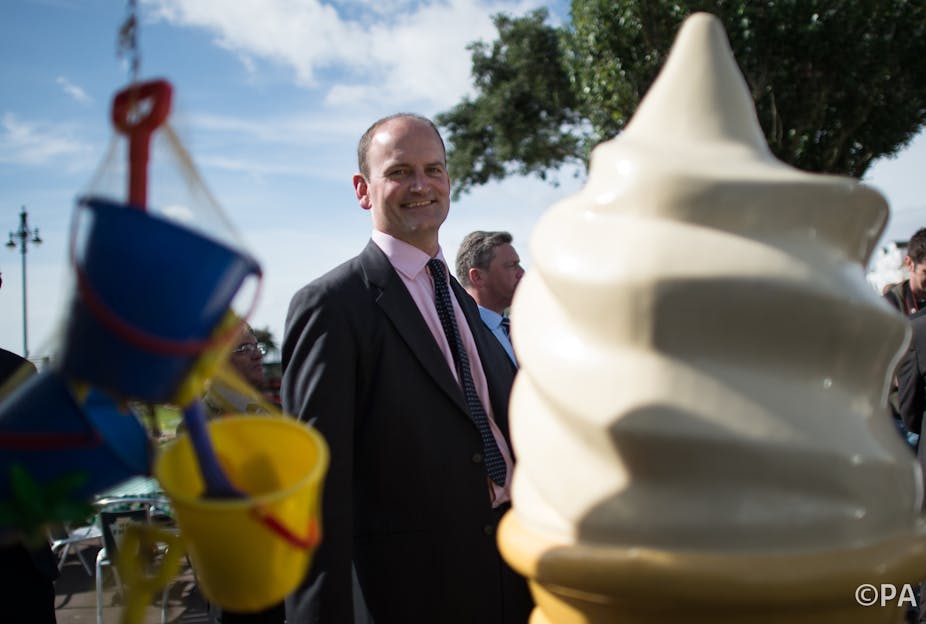The Conservative party is shortly to face a high-profile by-election this week in the wake of the defection of Clacton MP, Douglas Carswell. Senior figures in the party are understood to be deeply concerned about losing more members to UKIP. But the history of defections in British politics suggests that the Tories can probably stand a few more losses.
UKIP has so far attracted three Conservative MPs. Bob Spink resigned from the Conservatives to support UKIP in 2008. He did not resign his seat to cause a by-election, but he was defeated at the general election in 2010. Carswell and Mark Reckless have both left the Conservatives this autumn to join UKIP and have resigned their seats to prompt by-elections. Carswell will fight for Clacton on October 9 and Reckless’ contest for Rochester and Strood is expected to take place on November 9.
Surviving the exodus
Mass defections from Britain’s political parties are rare, but not unprecedented. So far, they have never proved fatal to the party which lost the defectors, nor have they resulted in the formation of a new party with long-term viability.
In the 1880s, the Liberal party lost a significant group of its MPs when the Liberal Unionists left over their opposition to Irish Home Rule. The Liberal Unionists eventually merged with the Conservative Party in 1912. And in 1931 the Liberals lost 24 MPs to the newly-formed Liberal Nationals, whose diminished rump eventually merged with the Conservatives in the 1960s. More recently, in the 1980s, the Labour Party lost a significant number of defectors to the newly-formed Social Democratic Party (SDP). The SDP attracted a total of 28 sitting Labour MPs and one Conservative.
The SDP won a total of four by-elections after the defections. It took Crosby in November 1981, Glasgow Hillhead in March 1982, Portsmouth South in June 1984 and Greenwich in February 1987. But these were all newly-won seats. The only MP defecting to the SDP who resigned and re-contested his seat, Bruce Douglas-Mann, lost his by-election.
To compare the SDP and UKIP might imply a troubled future for Nigel Farage’s party. The SDP recorded 65,000 members at the end of 1981 and peaked at 50.5% in opinion polls. So far, UKIP has just under 40,000 members and a high of 23% in opinion polls.
Despite its initial success, the SDP performed disappointingly in the 1983 general elections as part of an alliance with the Liberals, winning just six seats, and again in 1987, when it won just five seats. In 1988, the SDP merged with the Liberal Party to form the Liberal Democrats.
So far, the scale of defections from the Conservatives to UKIP is much smaller than the Labour exodus to the SDP. UKIP may, of course, attract more defectors, but the momentum seems to have stalled. If UKIP had another defector lined up, the end of the Conservative Party conference would have been the moment to reveal it. That no announcement came spoke volumes. Any party members thinking of leaving are now probably waiting to see how the forthcoming by-elections pan out before deciding.
Even if more defections are on the cards, the three main parties have all been in existence for more than 100 years (if you include the Liberal element of the Lib Dems). This does not guarantee that they will survive indefinitely, but it does mean that they all have experience of recovery from serious set-backs. Even a large-scale exodus to UKIP would not necessarily be terminal for any of them.
After all, the Liberal Party was reduced to just five MPs at its lowest point in the 1950s before recovering to a peak of 63 MPs. The Labour Party had 288 seats in 1929 but just 52 by 1931 yet went on to win the 1945 election by a landslide. And even after the SDP split, the Labour Party recovered and in 1997 won an even bigger landslide than 1945. The Conservative Party lost half its seats in 1997, but became the largest single party again in 2010.
A loss in Clacton or Rochester and Strood wouldn’t necessarily be the end of the world either. In October 1930 the Conservatives, under Stanley Baldwin – arguably the most comparable Conservative leader to David Cameron – rallied after losing a by-election at Paddington South to a right-wing candidate from the Empire Free Trade Crusade who was backed by newspaper magnate Lord Beaverbrook. In the event this was to be the Empire Crusade’s only by-election victory.
Whether UKIP’s crusade will get the party any further remains to be seen, but on current evidence, the likelihood of an SDP-scale split seems remote.

